Resources
The resources on this page are available for use by the pharmaceutical industry, healthcare professionals (HCPs) and healthcare organisations (HCOs) to help them understand how Disclosure UK works.
Videos: Professional opinions of Disclosure UK
In May 2016 we held a live panel debate on transparency in the pharmaceutical industry and payments made to healthcare professionals in the UK. Gathering some of the key thinkers on the subject at the headquarters of the Guardian in London we looked at the challenges and more importantly the opportunities this provides pharmaceutical companies.
Below are two videos capturing the perspectives of some of those who joined us on the night.
Clearly this is incredibly topical, we have the whole subject of conflicts of interest, and who pays whom and what they get for it has been of massive interest to journalists like me for a very long time. And it's very interesting to see developments, not only in the pharmaceutical industry but many other areas as well and within medicine and healthcare.
The ABPI Code of Practice has not been a static thing it has developed and grown, and the disclosing of payments to doctors and nurses and clinical professionals was a big, an important step, and the creation of a searchable database is a powerful and important step.
I do not think anyone thinks it's the last word, but these are really tangible and important leadership moments that are changing the culture in the industry internationally,
Really it's an opportunity for us to disclose not only on the issues of payments but really why those payments happen so what are the participations when the collaboration that we are involved with, with, with doctors and nurses and patients and really excited to do that because if we think this is fundamentals to the way we drive innovation in medicine. So, really happy to be here today. It's very important when we are commissioning healthcare today that we see that conflict and payment, whether it's relevant coming through funding streams for work programmes, there's a whole issue around funding and also about conflict that we need to have in the transparency how they're in the public domain. It's critically important if you're going to deliver solutions and be successful for patients. It goes without saying we need to collaborate. So we've actually been at the forefront of collaboration with all stakeholders including industry, actually for 20 years and we know pretty much part with industry and almost everything we do in the context of research, but at every step we have to be transparent and open, and if we're not prepared to do that and we should not be doing what we're doing.
We need to just know that we need industry. We need industry to invest to bring their discipline their skills to bring us these products somebody made the point earlier, very few of us will be sitting here healthy as we are tonight if it was not for this industry's achievements in the last 50 years 850,000 People living with cancer now is a treatable disease so extraordinary industry and we should celebrate it, but we cannot take industry for granted. And I worry that a total anti industry based approach to total transparency we will end up. There's a danger we end up killing the goose that lays the golden egg
industry has been on a journey, I would say a pathway to changing the way that we operate and disclosure really is a significant step forward in terms of transparency and payments, allowing doctors to voluntarily declare their earnings ministry, but not say what that was for I think is actually wrong I think could make the situation worse, it may appear that we're doing more of an actually we're doing less but maybe allowing a small amount of doctors to really play the system that actually it's absolutely appropriate that we pay the right amount for that advice as you do in any industry when you get expertise. If we could actually work with the pharmaceutical industry and not consider them to be the evil empire. Okay, and then names only plastered on the front page if they do something wrong, and not mentioned at all when they do have a breakthrough drug, which happens all the time, then I think you'll find that people will be much happier to disclose, and as a professional body. We've been really clear that we expect people to declare everything at any interest I have, I fundamentally believe that the collaboration is critically important to the ferment of pharmaceutical science. And if we can not do that and do that in a way that both parties are happy about it. Then, You know, I think that's really doing patients a disservice if we put patient voice right at the heart of it, I do not think we can go far wrong and I think that will drive us into accelerators into this landscape of more transparent healthcare innovation ecosystem, which I think is genuinely, in the interest of all of us and it offers a win-win for patients for the NHS and for industry.
Disclosure UK publications
-
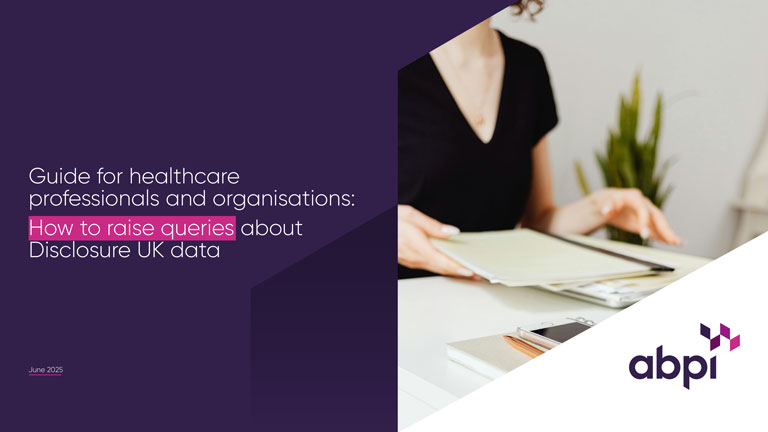
Guide for healthcare professionals and organisations: How to raise queries about Disclosure UK data - full text
If you are a UK-based healthcare professional (HCP) or healthcare organisation (HCO) and have a received a letter or email notifying you that a pharmaceutical company has disclosed transfers of value about you on Disclosure UK, this short guide shows how to easily review the information and, if necessary, raise queries.
-
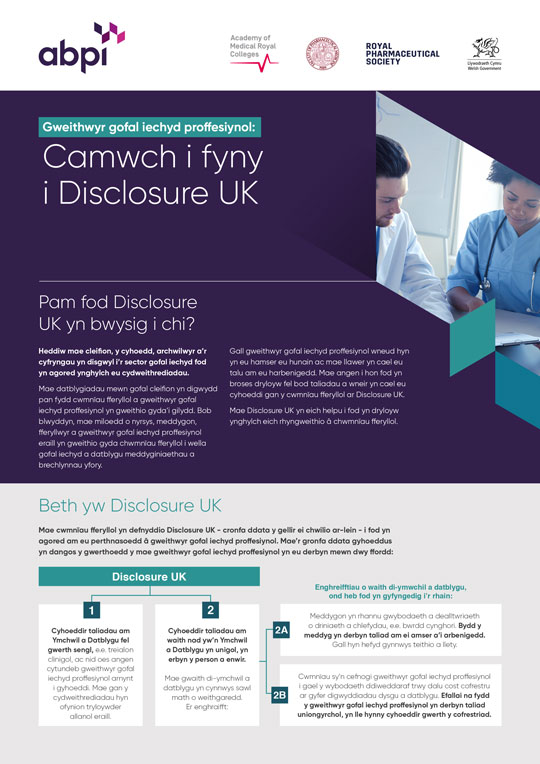
Gweithwyr gofal iechyd proffesiynol: Camwch i fyny i Disclosure UK
Heddiw mae cleifion, y cyhoedd, archwilwyr a’r cyfryngau yn disgwyl i’r sector gofal iechyd fod yn agored ynghylch eu cydweithrediadau. Mae Disclosure UK yn eich helpu i fod yn dryloyw ynghylch eich rhyngweithio â chwmnïau fferyllol.
-
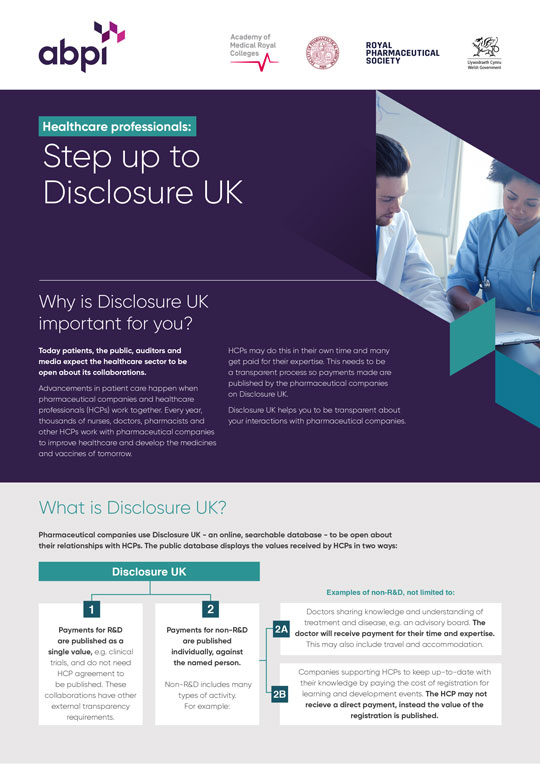
Healthcare professionals: Step up to Disclosure UK
Disclosure UK leaflet for healthcare professionals encouraging transparency. Co-branded with other professional healthcare bodies.
-
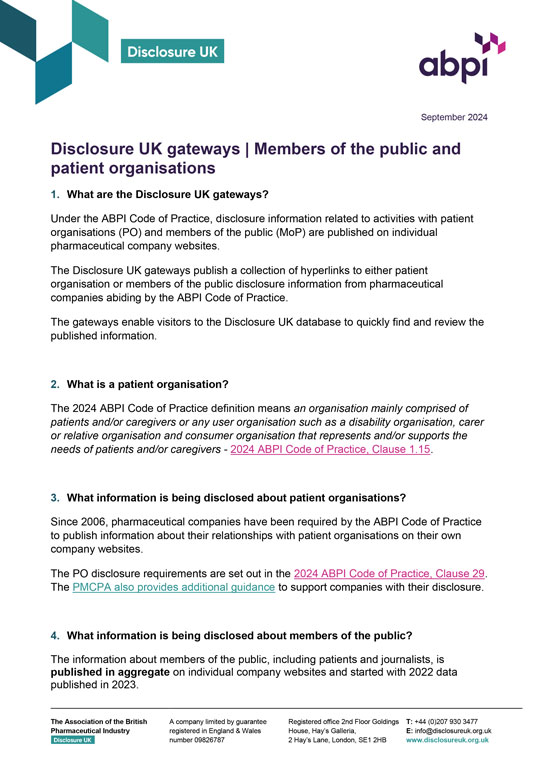
Disclosure UK gateway FAQs
Information on the Disclosure UK gateways connecting visitors to disclosure information about patient organisations and members of the public.
-
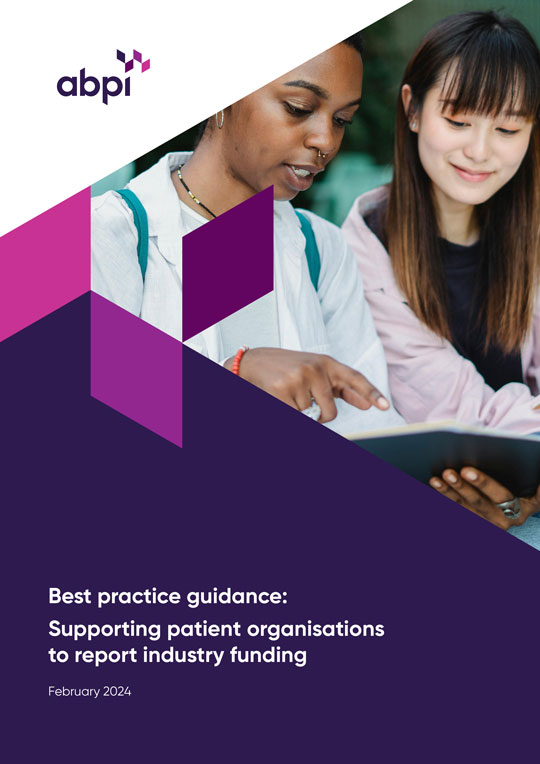
Best practice guidance: Supporting patient organisations to report industry funding
The ABPI Code of Practice places requirements on industry to publish annual lists of payments to patient organisations, and we endorse this approach. Currently, there is no similar requirement for those patient organisations in receipt of grants or funds from industry. In response, the ABPI has put together some advice for local disclosure mechanisms, based on current practice among industry.
-
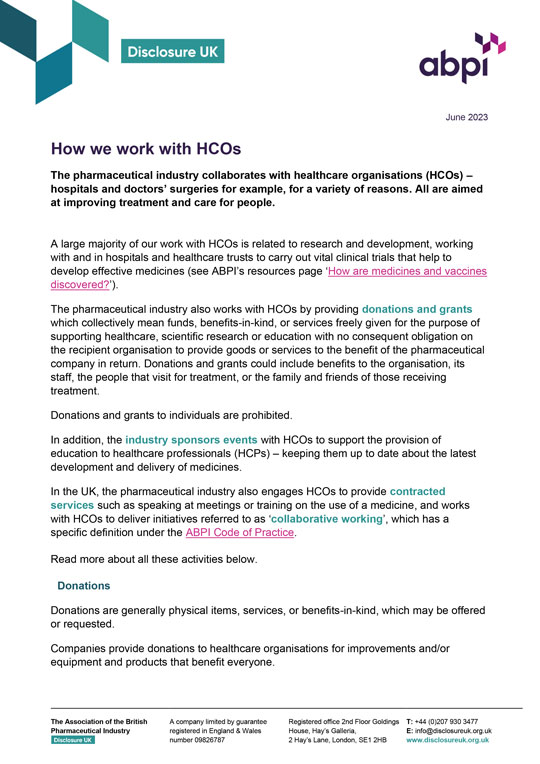
How we work with HCOs
Factsheet on how and why the pharmaceutical industry works with healthcare organisations
-
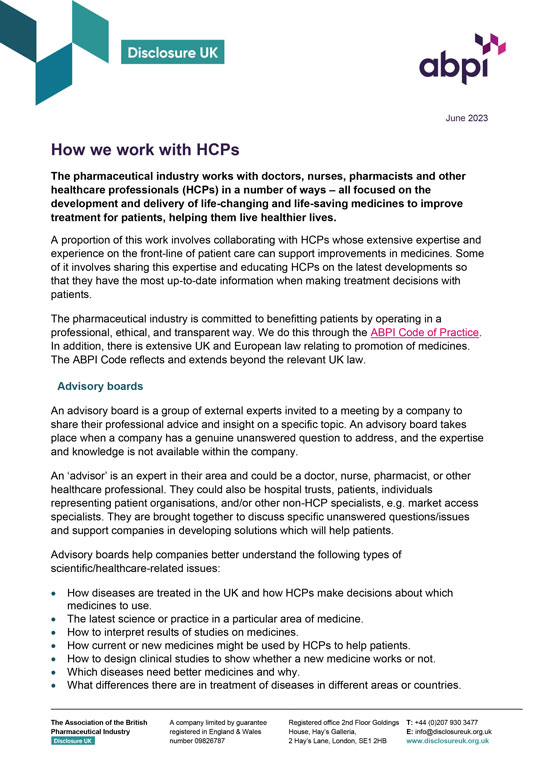
How we work with HCPs
Factsheet on how and why the pharmaceutical industry works with healthcare professionals
-
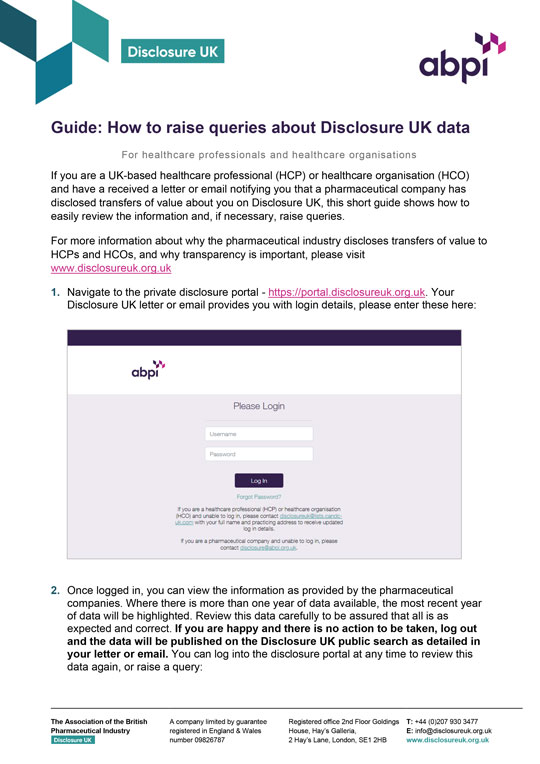
Guide to raising queries about the information on Disclosure UK for HCPs and HCOs
Guide to raising queries about the information on Disclosure UK for HCPs and HCOs.
-
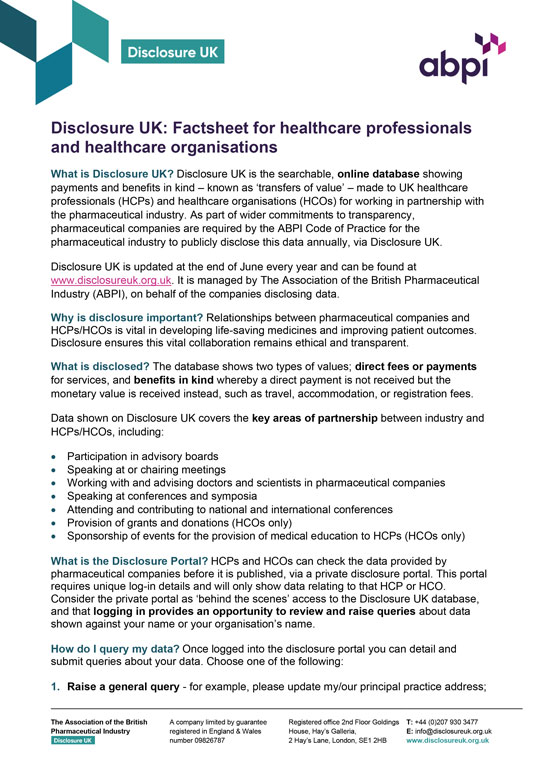
Pre-disclosure factsheet
Information about Disclosure UK for HCPs and HCOs with data disclosed.
-
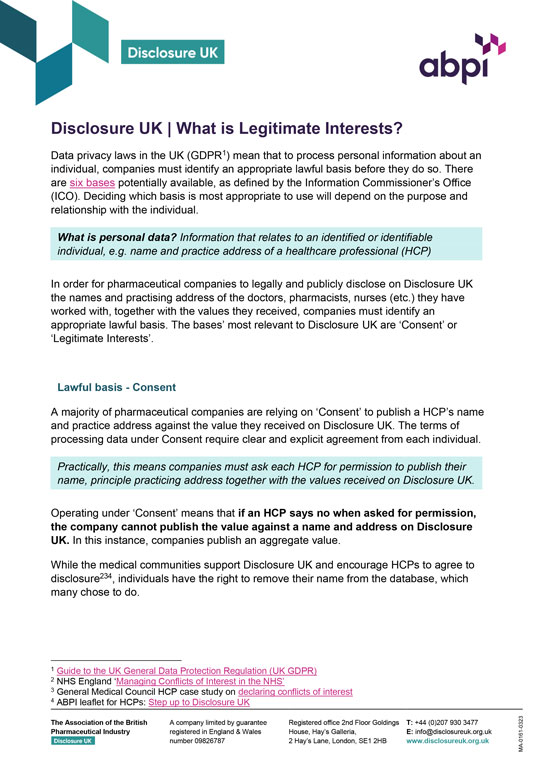
What is Legitimate Interests?
Data privacy laws in the UK (GDPR) mean that to process personal information about an individual, companies must choose a lawful basis before they do so. There are six bases to choose from, as defined by the Information Commissioner’s Office (ICO). Deciding which basis is most appropriate to use will depend on the purpose and relationship with the individual.
-
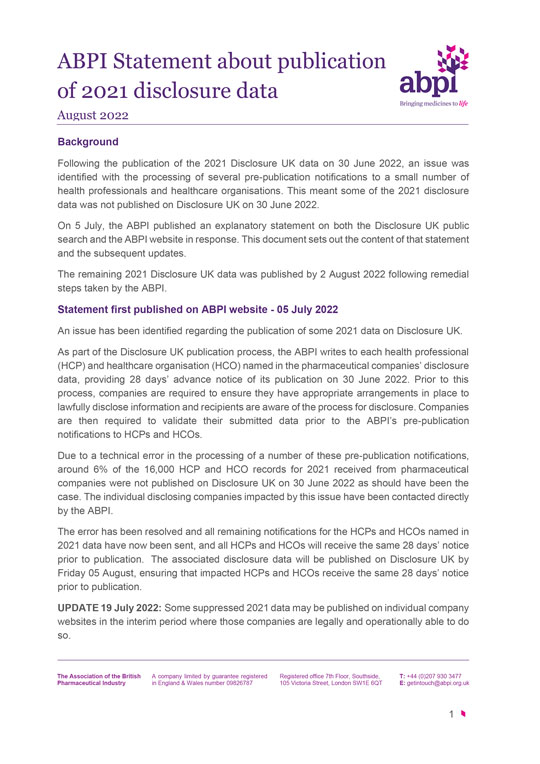
ABPI Statement about publication of 2021 disclosure data
Following the publication of the 2021 Disclosure UK data on 30 June 2022, an issue was identified with the processing of several pre-publication notifications to a small number of health professionals and healthcare organisations. This meant some of the 2021 disclosure data was not published on Disclosure UK on 30 June 2022.
-
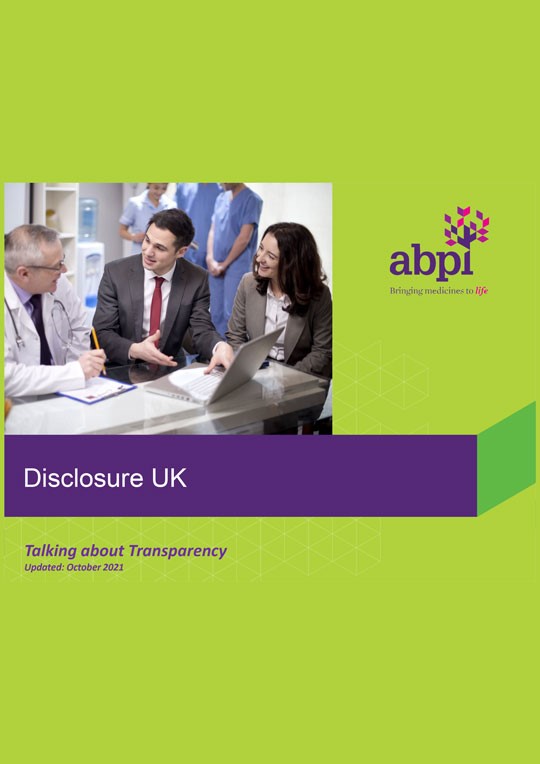
Disclosure UK presentation
PowerPoint introduction to Disclosure UK
Last modified: 20 September 2023
Last reviewed: 20 September 2023